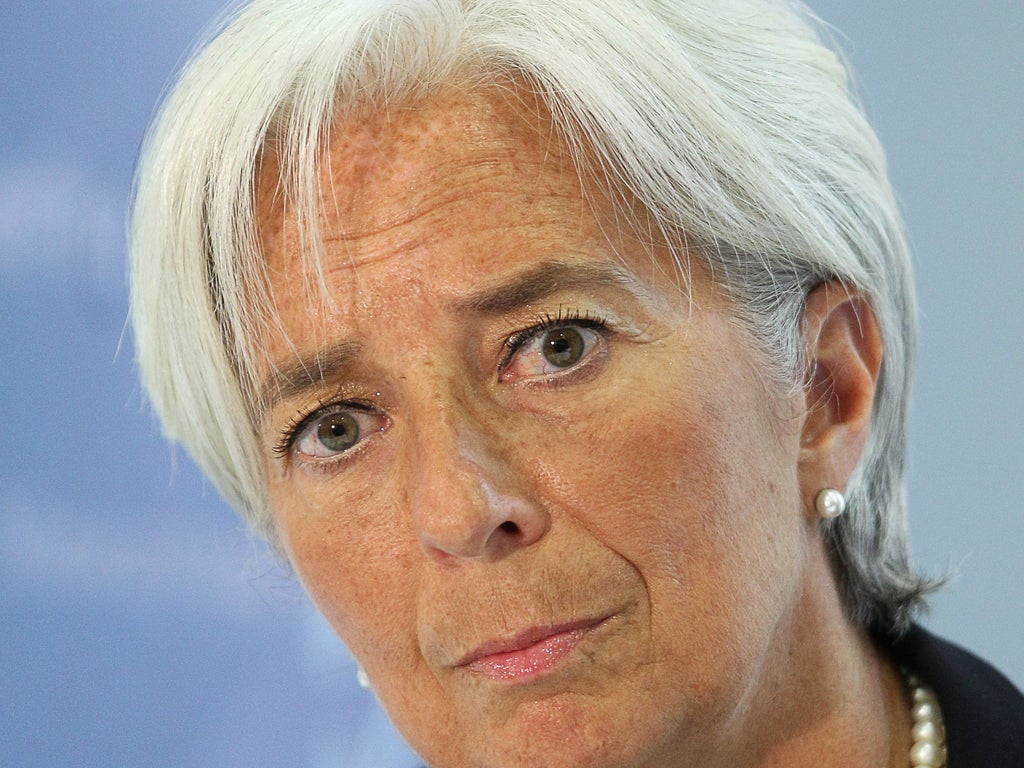Your support helps us to tell the story
From reproductive rights to climate change to Big Tech, The Independent is on the ground when the story is developing. Whether it's investigating the financials of Elon Musk's pro-Trump PAC or producing our latest documentary, 'The A Word', which shines a light on the American women fighting for reproductive rights, we know how important it is to parse out the facts from the messaging.
At such a critical moment in US history, we need reporters on the ground. Your donation allows us to keep sending journalists to speak to both sides of the story.
The Independent is trusted by Americans across the entire political spectrum. And unlike many other quality news outlets, we choose not to lock Americans out of our reporting and analysis with paywalls. We believe quality journalism should be available to everyone, paid for by those who can afford it.
Your support makes all the difference.The head of the International Monetary Fund warned the euro is under "acute stress" and piled pressure on Germany by advocating a series of measures to pull Europe out of its crisis that Chancellor Angela Merkel has strenuously opposed.
Christine Lagarde urged leaders of the 17 countries that use the euro to consider jointly issuing debt, aiding troubled banks directly and perhaps relaxing strict austerity conditions on countries that have received aid - all measures that Ms Merkel, the leader of the eurozone's largest and most powerful economy, has resisted.
But Ms Lagarde, speaking after a meeting in Luxembourg of the finance ministers of the 17 countries that use the euro, said the IMF had found the situation in Europe to be dire.
"We are clearly seeing additional tension and acute stress applying to both banks and sovereigns in the euro area," she said.
Asked what Germany would think of her suggestions, she smiled and said: "We hope wisdom will prevail."
Ms Lagarde issued her warning in the lead-up to a week that promises to be unusually active in the fight to save Europe's common currency.
Today, Ms Merkel will travel to Rome to meet Italian Premier Mario Monti and the leaders of France and Spain in Rome in an effort to forge a common strategy to save the currency that some, Ms Merkel included, consider essential to preserving the European Union itself.
By next Monday, Spain will make a formal request for financial assistance to bail out its teetering banks, according to Jean-Claude Juncker, the Luxembourg Prime Minister who is also president of the eurogroup of finance ministers.
Yesterday, Spain announced that independent auditors had found that its banks would need up to 62 billion euro (£50 billion) to protect themselves from financial shocks. Speaking after the eurogroup meeting, Mr Juncker said the other ministers had "invited Spain to pursue a clear and ambitious strategy which needs to be implemented swiftly and communicated early".
Also on Monday, the IMF, the European Union and the European Central Bank - the so-called "troika" overseeing Greece's bailout - will send representatives to Greece to begin a review of the country's progress in reforming its budget. Some European officials have said that a loosening of the harsh budgetary requirements that have sent Greece's economy into a downward spiral could be considered.
And on Thursday and Friday, leaders of the 27 countries that are members of the European Union will gather in Brussels for a high-stakes meeting on how to save the euro - and their intimately intertwined national economies.
That meeting will take place amid worldwide fears that an economic crack-up in Europe could drag down the entire global economy. Europe is a substantial trading partner with the rest of the world. Any deep recession in Europe will be felt in the order books of other leading economies - including the US
The IMF chief's backing for solutions that have been opposed by the German government comes amid increased pressure from a growing number of international leaders for Ms Merkel and the eurozone to find a comprehensive solution to the debt crisis rather than continuing to take piecemeal measures that provide only temporary relief. At this week's G20 summit of world economic powers in Los Cabos, Mexico, politicians, including US President Barack Obama, called on Europe to do what was necessary.
One of Ms Lagarde's recommendations for Europe was that eurozone leaders should consider issuing bonds or debt "in some form" backed by governments of all member countries - an idea Germany has vehemently opposed because, while it would immediately ease pressure on countries like Spain, it would put German taxpayers on the hook for foreign debts and increase Germany's cost of borrowing.
In addition, Ms Lagarde said it was necessary to break "the negative feedback loop" that occurs when governments take on more debt to bail out their banks, and she called on Europe's two emergency bailout funds to shore up shaky banks directly. She also urged the European Central Bank to adopt a more relaxed monetary policy.

Join our commenting forum
Join thought-provoking conversations, follow other Independent readers and see their replies
Comments